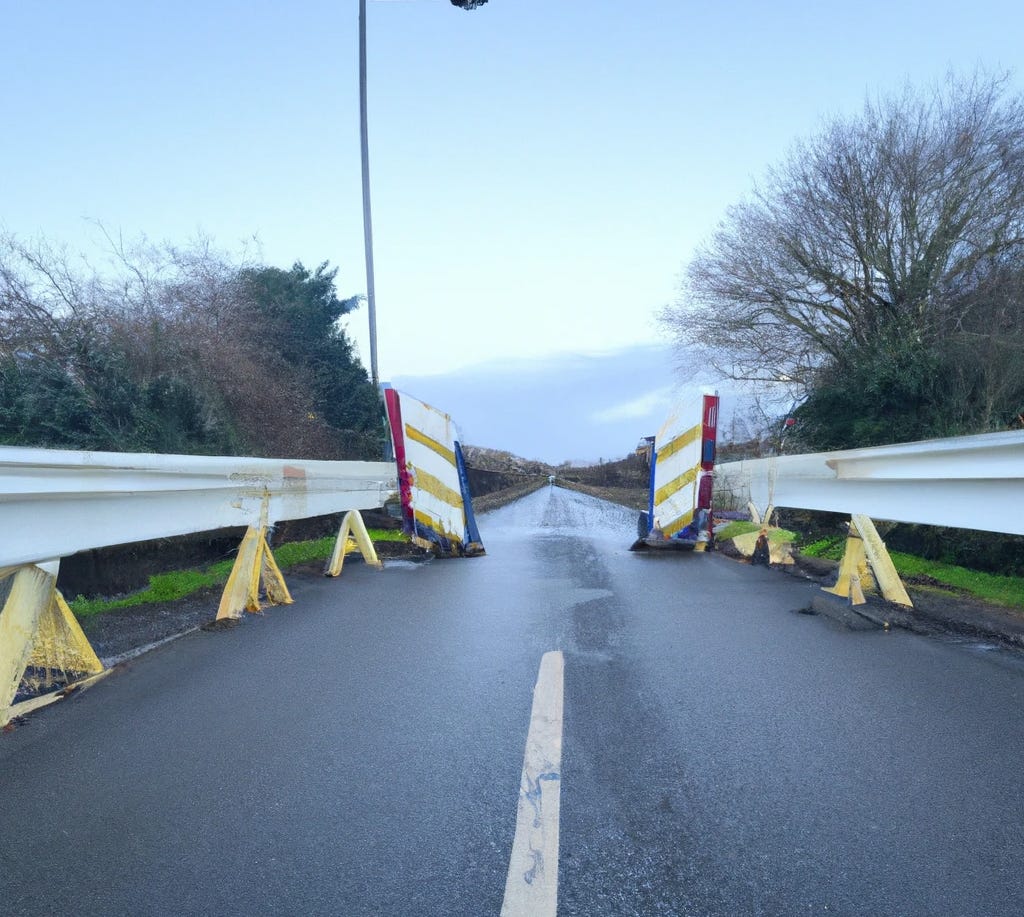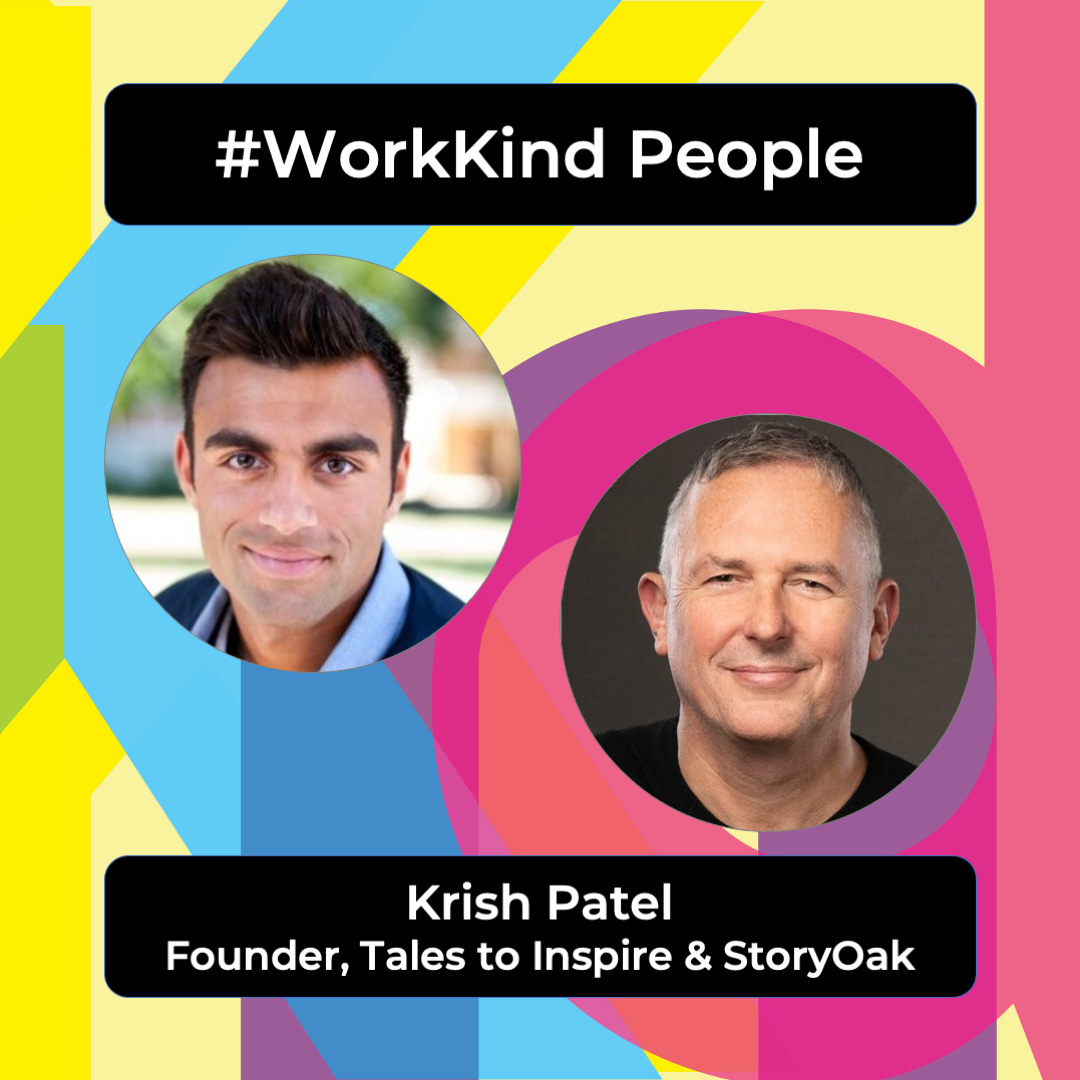Breaking Down Barriers, Building Bridges, and Deepening Trust Through Kindness
Today we launch #WorkKind People, a weekly interview with an eclectic group of people who have great insights and experiences and are all committed to #WorkKind.
DALL·E Prompt: A high-quality photo of a barrier crossing the road on a bridge. The barrier is smashed open so you can get through. Looking down the bridge into the distance.
I am humbled.
I am humbled by the people I meet who are kind to their core. Who do work that has kindness at its centre. Who create companies where kindness is why, what and how they are. And, because of this, the people there thrive and create a positive impact on the world.
I am humbled by people who literally take kindness out into the streets to help people less fortunate than themselves.
These people truly Work better, live more. #Workkind.
It isn't some idea or philosophy for them. It isn't some company initiative. It isn't a bit of charity on the side.
It is who they are.
Kind.
Today is the beginning of sharing their stories in a video and podcast series called #WorkKind People. I am delighted to be starting this series with Krish Patel. Founder of Tales to Inspire & StoryOak.
Watch the full video on YouTube and also at Vimeo.
Let’s get a flavour of the conversation by seeing what Krish has to say about the power of workplace kindness and breaking down barriers.
Breaking down Barriers
MAGNUS:
What is the greatest challenge that workplace kindness could be an answer to?
KRISH:
Workplace kindness can be a solution to breaking down barriers. It's for me, it's a huge thing, breaking down barriers. I go into so many organisations: schools, corporate spaces, wherever, and we leave our personality at the door. We're told to fit in. We're told to do all these different things. There's expectations.
We need to break down barriers. Being kind to each other, really see it that actually being kind to each other in the workplace will get 50% more efficiency than not being kind. To see the barriers that are in there and to break those down and to provide a culture that thrives instead of survives, that's what workplace kindness can do. You can completely flip that culture.
However, we have to take the first step. And the word kind isn't corporate savvy, and just because it's not the right linguistics or terminology, it doesn't get accepted. So there's a lot of cultural change that needs to be done, but I think it's just through testing it. But yeah, that's what I would do. And breaking down barriers is so important.
Building Bridges
MAGNUS:
What are your last parting words, Krish?
KRISH:
We all have a responsibility to connect with the person in front of us. So the words “that person has nothing in common with me” should never exist because everyone's got at least one thing in common with each other. Actually, the fact that we're human is one. So build a second bridge. You can be the best bridge builder the world has ever seen, but don't be the one to destroy the bridges. Be the person to build the bridge to connect those bridges so that you can connect with as many people as you can. So it's really taking responsibility to connect with those who are around you and then seeing their potential.
It's a little game I play with myself in terms of my role, which is to always try and connect with others. And sometimes I've been put in some difficult situations where, wow, “how the heck am I going to connect to that person?” Well, actually, I am a human, so that person is a human. There are a lot of bridges. I've got to find those bridges with that person and then go from there. So yeah, I think each of us has the opportunity to connect with others.
Watch this short extract from the full video:
Bio: Krish is the founder of the social enterprise Tales to Inspire, a not-for-profit organisation that shares people's stories across the world to encourage people to never give up. Since its founding in late 2019, Tales to Inspire has grown to now be able to deliver workshops for children in schools and inspirational sessions within the workplace. Their stories have been read in 107 countries around the globe and listened to in 75 countries. His projects of building a schoolhouse in Uganda after running across England and supporting homeless people in Manchester to go from the streets into employment are aligned with his aim of making a positive difference in this world. In February 2023, he launched StoryOak, a bespoke legacy-making service designed to capture individuals' unique life stories on film.
Links: Tales to Inspire
Socials: LinkedIn | Instagram | Twitter
Deepening Trust Through Kindness
My conversation with Krish set me thinking about the power of trust at work — it’s a fundamental of a healthy and productive workplace.
I realised that when barriers are broken down and connections are made, you are on the path to building trust. A path that also creates psychological safety — the belief that you can express your thoughts, ideas, and opinions without fear of negative consequences.
The secrets of high-performing teams was the quest of Google’s Project Aristotle. After two years of analysing 180 teams and hundreds of different data sets, they uncovered the #1 factor that creates high-performing teams:
Psychological safety — Employees felt it was far more important how team members worked together than who was on the team.
As they said:
“Psychological safety should be considered the fundamental platform from which everything else thrives.”
So, how does psychological safety connect with trust?
Psychological safety is closely related to trust, but they are not the same thing. Trust refers to the belief that someone is reliable, competent, and honest. Psychological safety, on the other hand, is the belief that you can express your thoughts, ideas, and opinions without fear of negative consequences.
Psychological safety can be seen as a prerequisite for trust to exist. If employees do not feel psychologically safe, they may not trust their colleagues or managers, as they may fear negative consequences for expressing their opinions or ideas. On the other hand, if employees feel psychologically safe, they are more likely to trust their colleagues and managers, as they know that they can express their thoughts and opinions without fear of negative consequences.
Trust and psychological safety are both essential for building a positive and productive workplace culture. While they are closely related, they represent different aspects of the workplace environment. Trust is more focused on relationships between individuals, while psychological safety is more focused on creating a safe and supportive work environment. Both are important for creating a workplace where employees can feel valued, respected, and supported, which can lead to greater engagement, productivity, and success.
So, how does trust connect with kindness?
From our practical experience working with over 30 companies and thousands of individuals, combined with more research on workplace kindness than anyone else, we know:
Kindness builds both psychological safety and trust faster than anything we’ve seen.
When colleagues are kind to one another oxytocin is released in higher levels among everyone present. Oxytocin is the “bonding hormone” — it brings people closer together. See Paul Zak’s work for more detail.
When all colleagues operate in a culture that is kind they appreciate both individual contribution and diversity. The operating principle is “We is greater than me.” A way of working which leaves everyone and everything better (our definition of kindness) even if it hasn’t explicitly been defined that way.
Kindness is Fundamental to Trust and High-Performing Companies
Teams which have psychological safety and trust one another are the highest-performing.
High-trust companies significantly out-perform low-trust ones. Paul Zak and his team found that, compared with people at companies where trust was low, people at high trust companies report:
106% more energy at work
76% more engagement
74% less stress
50% higher productivity
40% less burnout
29% more satisfaction with their lives in general
13% fewer sick days
Kindness always makes business sense.
So, as Krish said:
“We all have a responsibility to connect with the person in front of us.”
Break down those barriers, build those bridges, create psychological safety, and deepen trust.
That’s what #WorkKind is.
In the #WorkKind People interviews, I ask everyone the same 12 questions. I’ve interviewed eight people so far, and their responses have been fascinating — you’ll see as they’re released each week.
A favourite question of mine led to today’s practice:
What is your favourite question to ask others and yourself?
Building on this idea of breaking down barriers to build bridges, psychological safety, and trust, I'll now share Dr. Lasith Ranasinghe’s question that he regularly asks people:
What gets you excited?
As he went on to say:
“I think one of the most satisfying aspects of human interaction is being able to speak to someone and hearing them talk about something with real passion.”
So, today’s practice is to ask this question of a work colleague. It's a fantastic way to get to know them better, and break down barriers...
Let me know how you get on.
Watch the full #WorkKind People interview with Krish Patel on YouTube and also at Vimeo.
Work better, live more. #WorkKind
This is the Why for this newsletter. A happy day for me is one in which I hear your stories of how you #WorkKind. So hit reply or message me with your ideas, experiences, and stories.
Please, also:
Check out the #WorkKind Community.
Follow my stories, ideas, and practices to help you thrive on the socials that suit you.
And, most importantly, be kind to yourself today.
See you next Wednesday.
Magnus









